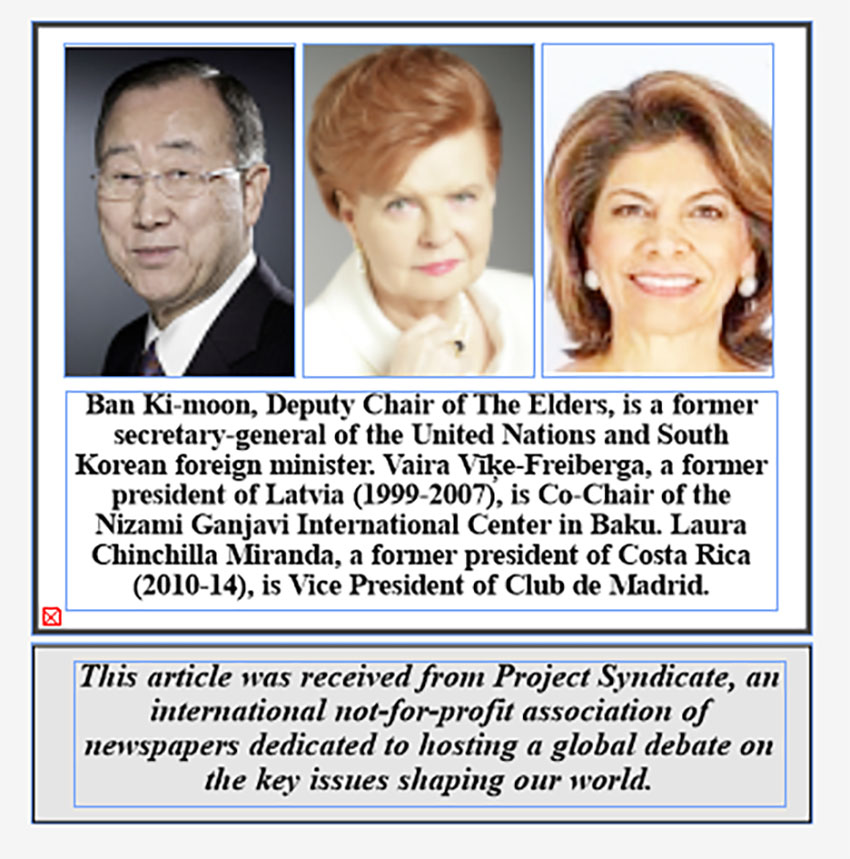By Ban Ki-moon, Vaira Vīķe-Freiberga, and Laura Chinchilla Miranda
LONDON – If the United Nations Climate Change Conference (COP28) in Dubai is to be judged a success, it will have to bring an urgently needed breakthrough on climate finance. Sultan Al Jaber of the United Arab Emirates, the president of this year’s COP, and Brazilian President Luiz Inácio Lula da Silva, whose country will assume the G20 presidency in December, must work in tandem to establish a facility that would provide the Global South with at least $1 trillion annually to invest in development and climate-change mitigation and adaptation.
Al Jaber has already recognized the importance of fixing climate finance, which he listed as one of the four pillars of COP28. Moreover, in August, he expressed support for reforming international financial institutions, as “all forms of finance must be more available, more accessible, and more affordable,” and called on donor countries with overdue pledges to “show me the money.”
As CEO of Abu Dhabi National Oil Company, Al Jaber has a unique opportunity to ensure that the UAE, other Gulf states, and Norway – all beneficiaries of high energy prices – lead the way in bridging the climate financing gap faced by low- and middle-income countries (LMICs). Not only are these poorer countries transferring billions of dollars to oil-producing states, which has contributed to the recent rise in extreme poverty; they also suffer significantly from air pollution caused by burning fossil fuels.
Specifically, the president of COP28 must present a proposal to recycle a fraction of these petrostates’ record-high oil and gas revenues to a facility aimed at accelerating the green transition in the Global South. Given the failure of rich countries to meet their long-standing pledge of channeling $100 billion per year to developing countries for climate mitigation and adaptation, now is the time for action.
According to Fatih Birol, the executive director of the International Energy Agency, petroleum revenues soared to $4 trillion in 2022, compared to an average of $1.5 trillion in recent years. This is 20 times the foreign aid from official donors in 2022, more than 30 times the combined budget of all multilateral development banks (MDBs), and 40 times the $100 billion per year that rich countries promised (but have yet to deliver) back in 2009.
Some private oil companies have already paid extra taxes on their windfall profits. But, given that state-owned companies control most of the world’s oil production, petrostates have been the biggest beneficiaries by far. Last year, OPEC countries alone earned $888 billion in hydrocarbon-export earnings, compared to $576 billion in 2021.
The UAE’s own energy-export earnings rose from $76 billion in 2021 to $119 billion in 2022. Qatar’s increased from $87 billion to $132 billion, and Kuwait’s jumped from $63 billion to $98 billion. Perhaps the two biggest winners were Norway, where energy-export earnings swelled from roughly $87 billion to $174 billion, and Saudi Arabia, where earnings surged from $191 billion to a whopping $311 billion. A voluntary levy of $25 billion, which represents 1% of last year’s windfall oil and gas revenues and only 3% of the major petrostates’ export earnings, could kickstart a program of investment in the Global South.
The principle of fair burden-sharing is simple: countries and sectors that have historically contributed the most to greenhouse-gas emissions and boast the highest per capita incomes should bear more of the costs for global climate action. While the proposed levy is an important part of this model, it must be complemented by multibillion-dollar guarantees from historic and current emitters who also have a responsibility to pay their fair share.
MDBs could leverage such guarantees four times over to create new resources that would help LMICs address both development challenges and global warming. A slew of reports by international bodies have endorsed such an approach. Most notably, three recent reports to the G20, including those by economist N.K. Singh and former US Treasury Secretary Lawrence H. Summers, advocated the strategic use of guarantees.
To mobilize the $1 trillion in annual investment required to help the Global South shift to clean energy, it will be crucial to implement the Singh-Summers proposal, which calls for tripling the World Bank’s annual spending to $390 billion.
It will also be necessary to pursue Barbadian Prime Minister Mia Amor Mottley‘s ambitious Bridgetown Initiative, which proposes channeling $100 billion in unused special drawing rights (the International Monetary Fund’s reserve asset) to developing countries.
These interventions align with the recommendations in the “Breakthrough for People and Planet” report by the UN Secretary-General’s High Level Advisory Board on Effective Multilateralism, which recognizes the importance of increasing financing from all sources: national, global, public, and private.
To support this endeavor, Lula should offer to convene a joint online session with the G20 and OPEC where petrostates and historic emitters can agree on this new funding arrangement and commit to contributions based on their capacity to pay. Such an outcome would augur well for the negotiations at COP28 and unlock progress on global climate goals.
This commentary is co-signed by:
Ban Ki-Moon – Secretary-General of the United Nations (2007-16)
Vaira Vike-Freiberga – Co-Chair NGIC, President of Latvia (1999-2007)
Laura Chinchilla Miranda – President of Costa Rica (2010-14) and Vice President of Club de Madrid among others.
Copyright: Project Syndicate, 2023.






